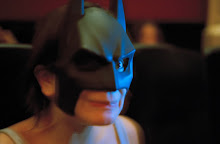 Persepolis is a autobiographical graphic novel written and illustrated by Marjane Satrapi. Satrapi grew up in Iran and witnessed both the Iranian Revolution and fall of the Shah. The novel is a collection of short stories about her childhood. I read Persepolis a long time ago, before I saw the movie (which I recommend!), and re-reading it I found that there was even more within her stories to discover. The novel is named after the ceremonial capital of the Persian empire that existed from 558-330BC. Persepolis is now a world heritage site and contains many fascinating ruins. The ancient Persian empire encompassed modern day Iran and was once the largest empire in the ancient world. Satrapi's choice of title carries many underlying meanings. The biography is especially powerful because it illustrates how she viewed her world as a child, and how she reacted to all the extreme events taking place. I think the fact that it was a series of stories rather than one long story allowed Satrapi to convey her message and feelings in a more complete way.
Persepolis is a autobiographical graphic novel written and illustrated by Marjane Satrapi. Satrapi grew up in Iran and witnessed both the Iranian Revolution and fall of the Shah. The novel is a collection of short stories about her childhood. I read Persepolis a long time ago, before I saw the movie (which I recommend!), and re-reading it I found that there was even more within her stories to discover. The novel is named after the ceremonial capital of the Persian empire that existed from 558-330BC. Persepolis is now a world heritage site and contains many fascinating ruins. The ancient Persian empire encompassed modern day Iran and was once the largest empire in the ancient world. Satrapi's choice of title carries many underlying meanings. The biography is especially powerful because it illustrates how she viewed her world as a child, and how she reacted to all the extreme events taking place. I think the fact that it was a series of stories rather than one long story allowed Satrapi to convey her message and feelings in a more complete way.I adore the style of Persepolis. Satrapi did the whole novel in black and white, and uses negative space to create characters and shapes much of the time. Her use of black and white and relatively simple shapes and characters really add to the overall feel of the story. I found that her art reminded me of the murals found at many ancient persian sites, and the way she styles some of her panels (especially those in which she has many of the same soldier or corpse over and over) seemed to parallel ancient artwork. Another thing to note is the cover of the volume. It is very colorful except for the character represent herself, who sits vieled and staring, drawn in black and white. Both the entire cover and the drawing of her are surrounded by an ornate frame. The text is cracked and wavy, reminding one of the walls of ruins or pillars.
The relationship between Marjane and her grandmother was especially interesting. Her grandmother seems to have been extremely important to her whole family, and provided a sort of moral backbone and support. The few details about her grandmother's life were fascinating, and I would like to learn more. Marjane Satrapi wrote another graphic novel, entitled Embroideries, in which her grandmother is the main character. Besiders Marjane herself, I found her uncle Anoosh to be very interesting. He seems to have had a profound impact on her life, even after his execution. Their story was one of my favorites to read, as well as the one describing the homecoming of the released political prisoners. Both were fascinating, and at times humorous despite the circumstances the characters were living in.
I'll have to buy the next volume, and I think I'll rent the movie again!







